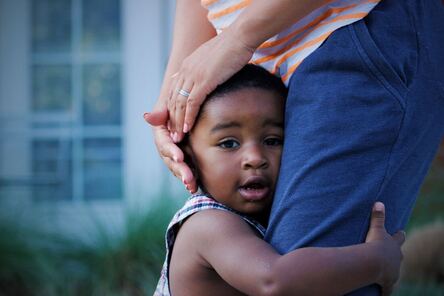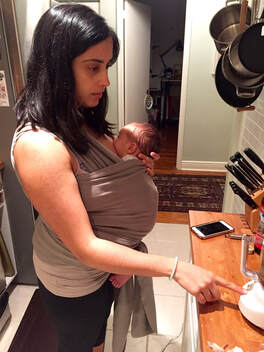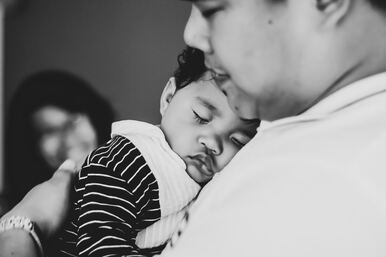|
Sleep regression. Potty training regression. Separation regression. The implication is always of a step backward. A loss of sorts. Of course, what we mean as parents is that our baby or toddler is behaving in a way we thought they had outgrown. Maybe they're waking more often or clinging to us at drop-off when they used to walk in to daycare without a second glance. Regressions are such a normal part of development, that some are even presented as inevitable. "The dreaded four month sleep regression" comes to mind. They become something to check off a list of milestones. Something to get through. To tackle. A different way to think about regressions is that they are periods of time when our baby or toddler (or child, or spouse, or friend) needs more support to do some of the things that they are capable of doing. It may be that they have acquired a major new skill that their body and brain need to practice over and over to master--like learning to roll. Or that a new perspective on their independence, such as when they learn to crawl, has suddenly made them more aware that they don't control your comings and goings. Maybe they moved up a room in daycare and the change in environment means they need extra cuddles and time to feel safe. Whatever the reason, these are moments when our child is seeking support and reassurance. Sometimes it may be emotional, such as reminding a recently potty trained child that they will always be your baby and you will always care for them. Sometimes it may be more physical, such as helping your newly rolling baby get back to sleep comfortably. At times it may require lovingly holding boundaries to help a toddler feel safe. Rest easy that your child is not somehow backsliding. They are growing and changing, and needing help from their loved ones is a part of that. There is a predictable cycle to development. One part of the cycle is outward facing. These are times when our child is feeling capable, confident, and curious to venture into the world and try new things. The other part of the cycle faces in, towards home. These are times when our child needs reassurance, welcoming arms, and some willing help. Children are always at some point of this cycle, and it can change from moment to moment. Our job as caregivers is to notice and respond as well as we can. We won't be able to always meet the needs but it matters that we're prepared to try. When children can draw nourishment from our empathy, they are able gather themselves and reemerge with confidence. What would happen if instead of framing the inward facing moments as regressions, we thought of them simply as a time when our child needs us close by. A time of gathering? The first few months home with my daughter were a time of tremendous growth for my husband and I. There were many things that we suddenly found very difficult to do. Making dinner felt nearly impossible some days. So we reached out for help. What did that help look like? Having a parent or friend make us dinner. Ordering take-out. Hearing, "This is a hard time right now, I can help." not "You can do it! You know how to make easy dinners. I believe in you." Just because you offer your child more support today, does not mean that they will become dependent on it for the long run. If they have been given sensitive support, your child will shortly go back to doing things for themselves, just as my husband and I now cook dinner most nights. (And when we need to, we still order take-out.) A very important caveat, a true developmental regression such as a loss of skills, vocabulary, or movement abilities should be discussed with your child's pediatrician as it could be a cause for concern. Similarly, if you sense that your child's development has stalled, it is always best to bring up your observations with your child's doctors, teachers or team of specialists. Trust yourself if you have any doubts. Sleep is a topic that looms large over the first (and second, and third) year of parenting. From the moment my child was born, I was getting advice from every direction. Even when it wasn't advice the question of "How does she sleep?" was ever present. It was hard to resist being consumed it, since every nap and night presented the opportunity to answer differently. My baby slept... like a baby. At first a lot, then less and less. Sometimes on her own, often on me, or my husband, or a very willing grandparent. Patterns would emerge, then fall away. The things we knew to be true about her, would become so far from the truth as to be unthinkable just a week or two later. She nursed to sleep until she no longer did. Not because of me, but because something within her shifted. In short, her sleep evolved. At times with some gentle nudging from us. As for us, we slowly, sometimes painfully learned to be flexible. Helping a baby sleep takes patience. It takes being aware of your baby and their needs, as well as your own. What your newborn needs is different from what your six month old needs. And what one child needs will be different from another. You and your baby may both need more time together at night after returning to work, and you might also really need some rest. Like all of our relationships, it is a balance. And it is okay to change our approach when it is no longer working. Baby Sleep in the First Year is ever unfolding. And so this workshop is about freeing you from the weight of total responsibility for your baby's sleep, while offering the tools to support both your baby and your family in getting the sleep you need however that looks.
We will look at the science of infant sleep, as well as the cultural influences. We will talk about temperament, early experiences, biology and how they function in terms of sleep. We will talk about what your family needs. Maybe that is time with the baby in the evening after work, or time with your partner or for yourself. Maybe it is a baby that can nap on the go, or maybe you need the consistency of a nap at home. We will talk about sleep training and how to support your baby to sleep on their own while cultivating a secure attachment. We will take a look at a variety of sleeping arrangements. And I will leave you with a framework and plan to ensure that baby gets the sleep and the nurturing relationships they need to thrive. All without judgment. Upcoming classes: Baby Sleep in the First Year October 5th & December 7th at Parent Craft And if you can't make it in person, I offer these classes in your home (in parts of NYC/Brooklyn) or over the phone (anywhere). |





 RSS Feed
RSS Feed
